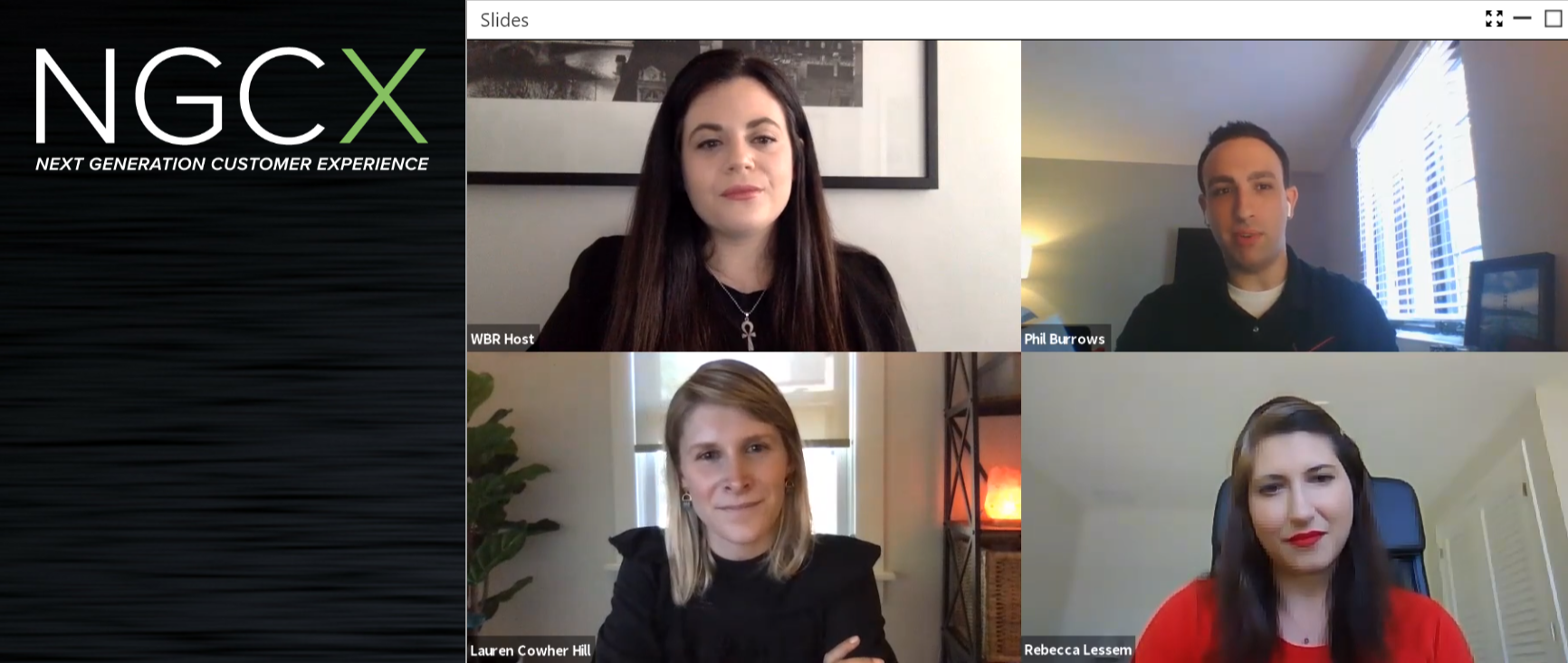The Next Generation Customer Experience (NGCX) virtual event on July 6-7 brought together customer experience leaders from various industries to talk about prioritizing customer centricity, managing remote teams, and other innovative strategies that boost customer success. CX executives shared how their companies navigated the challenges of the COVID-19 crisis, including their best practices for strengthening employee engagement while providing value to customers during uncertain times.
I had the privilege of attending both events and after digesting all the content discussed, here are my top four key insights from the CX experts.
1. Customer success requires a broader understanding of ROI.
“As CX leaders, sometimes our challenge is, ‘do the right thing’ can mean short-term cost without totally quantifiable long-term gain. That notion of ROI sometimes has to lean on the trust that if you’re a consumer-facing business and you’re in alignment with the needs of your customers, it will pay off in the long term.”
Lauren Cowher Hill, Director of CX, ClassPass
ClassPass, an online fitness platform that connects customers with gyms and studios, had to suspend the majority of their in-person operations as stay-at-home orders forced fitness studios to shut down. While this had a serious impact on revenue, the company maintained that doing right by their customers and studio partners was paramount. They paused customers’ accounts and allowed app credits to roll over until in-person classes resume. They offered livestream classes, with 100% of revenue going to their partners. They also put up a Partner Relief Fund where customers can donate to their favorite studios, and the company will match up to $1 million in contributions.
These initiatives may not have a quantifiable return on investment in the short term, but the company believes the right response in a crisis will only serve to strengthen their relationship with their customers in the long run. ROI is no longer just a direct calculation of immediate gains, but a long-term reward rooted in empathetic and sustained engagement.
2. Customer centricity entails an intentional and holistic approach.
“We designed our support experience to support the business that we knew we needed to build, and not just the problems that our users have. With that longer term perspective from the start, we started thinking of customer experience as a growth driver and not a cost center.”
When Ali Rayl and the other founders built Slack, they treated customer experience not just as an auxiliary department but as a critical part of growing the company. This means making sure that their frontline support staff were engaged in their work and had the autonomy, tools, and knowledge to do their job well. No quotas or time limits were imposed on customer support resolution. Instead, CX was measured by how easy it was for customers to get their issues resolved and the impact of customer support in helping them fix the problem.
For Slack, customer problems are not just tickets to answer; they’re pain points that the company can either mitigate through customer support or solve through investment in product engineering design. In order to know how to best address an issue, the CX team needs to be in tune with customers’ needs and how the platform can best serve those needs.
3. Well-managed remote teams make for resilient operations.
“We had a bit of a head start in the remote work world... So when COVID hit, we were well prepared to deal with that in most aspects... We made the transition pretty quickly after the pandemic started to rise in early March. We doubled down on a lot of the principles and initiatives that we created prior to going into the COVID world especially on the culture and engagement end of things.”
Colin Crowley, VP, Customer Experience, Freshly
Freshly, a meal delivery service, has about 200 people in their Customer Support department spread out across the U.S. as well as in offshore teams in the Philippines and South Africa. To effectively manage this remote operation, the company utilized digital tools and built systems for communication, quality assurance, coaching and mentoring, and employee feedback. They treated their offshore staff as an integral part of the company, setting up the same type of leadership and management structure as their U.S. teams, and holding them accountable to the same KPIs.
These practices served them well as they shifted to a work-from-home model. Their internal communications system, for instance, became an effective tool for empowering customer service agents to address COVID-related customer concerns. Their prior experience with remote work enabled them to quickly adapt to the challenges of the COVID crisis without compromising their business operations.
4. The human experience is central to customer success.
“It’s not about a shift in technology, messaging, or communication channels. It’s about strategically reimagining your people, your processes, and technology in a way that puts individual needs at the heart of your business.”
Jennifer Buchanan, Senior Manager, Deloitte Digital
Even as automated customer service gains ground, a Deloitte study found that over 70% of customers still prefer to talk to a service agent. They feel that a real person can understand and take ownership of their concern more adaptively, making it the most efficient way to get their problem solved.
Instead of relying on a one-size-fits-all customer support automation system, companies need to utilize data, automation tools, work processes, *and* people to be more responsive to customers’ unique needs and preferences. This also means that companies will have to get to know their customers as individuals and not just as archetypes based on demographic and transactional data. Building emotional bonds with customers is key to creating brand loyalty, and this requires putting humans at the forefront of customer service.
Over to you
As we face unprecedented global challenges, companies must have perceptive and agile CX teams that can best serve customers’ needs and add real value to the business. Do you need help in scaling or optimizing your CX team? Talk to us today.
.png)







